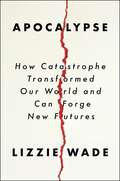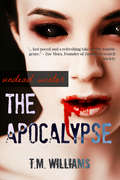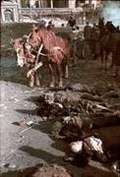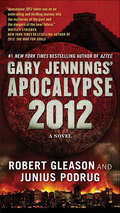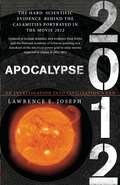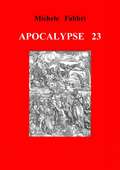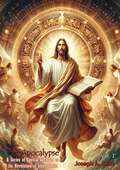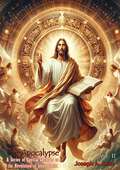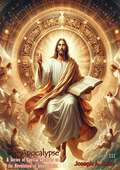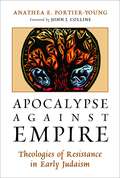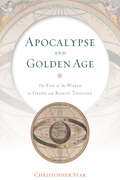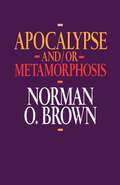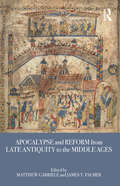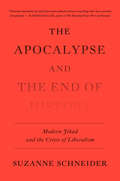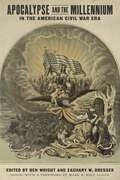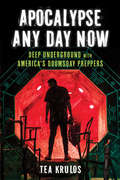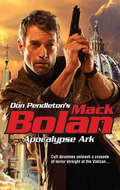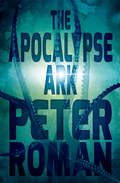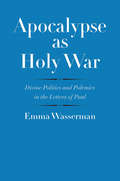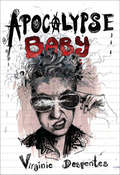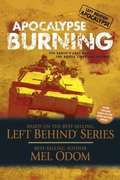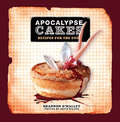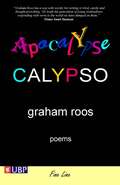- Table View
- List View
Apocalypse: How Catastrophe Transformed Our World and Can Forge New Futures
by Lizzie WadeA Next Big Idea Club Must-Read Book of May 2025 • A Publishers Weekly Most Anticipated History Book of the Year • A The Millions Most Anticipated Spring Book of the Year"Lizzie Wade is an exceptional journalist and a master storyteller. She reminds us that survival always has been, and still is, possible, and that our world always has been, and still is, a choice." –Ed Yong, author of An Immense World“This book upended my understanding of the ancient world. Wade renders our deep past in vivid prose, showing us that times of great rupture also bring great possibilities for new ways of living, if we let them. Apocalypse is the best kind of history book: vibrant and vital.” —Zoë Schlanger, author of The Light EatersA richly imagined new view on the great human tradition of apocalypse, from the rise of Homo sapiens to the climate instability of our present, that defies conventional wisdom and long-held stories about our deep past to reveal how cataclysmic events are not irrevocable endings, but transformations.A drought lasts for decades, a disease rips through a city, a civilization collapses. When we finally uncover the ruins, we ask: What happened? The good news is, we’ve been here before. History is long, and people have already confronted just about every apocalypse we’re facing today. But these days, archaeologists are getting better at seeing stories of survival, transformation, and even progress hidden within those histories of collapse and destruction. Perhaps, we begin to see, apocalypses do not destroy worlds, but create them anew.Apocalypse offers a new way of understanding human history, reframing it as a series of crises and cataclysms that we survived, moments of choice in an evolution of humanity that has never been predetermined or even linear. Here Lizzie Wade asks us to reckon with our long-held narratives of these events, from the end of Old Kingdom Egypt, the collapse of the Classic Maya, to the Black Death, and shows us how people lived through and beyond them—and even considered what a new world could look like in their wake.The more we learn about apocalypses past, the more hope we have that we will survive our own. It won’t be pleasant. It won’t be fair. The world will be different on the other side, and our cultures and communities—perhaps even our species—will be different too.
The Apocalypse
by T. M. Williams"A sick part of me hoped they would run after her, kill her and maybe get their feed -- giving us one more uneventful night and leaving us alone. Don't judge me. Ethics and morality no longer exist in our world. It's a luxury of the past, afforded only to those who had future." T.M. Williams changes the cycle of the zombie evolution from extermination to adapation in this new generation of the Undead. The year is 2021 and the infection is spreading rapidly through the world. These zombies are conniving, smart, quick, and acting on raw primal urges, robbing the world of humanity. They possess an unnatural intelligence and completely lack a moral compass. View the apocalypse from the eyes of the innocent to those newly infected -- from individuals such as the President of the United States to a mother protecting her child at all costs, making decisions no parent could expect. The Apocalypse takes the reader on a psychological and emotional thrill ride with an ending sure to leave you thinking long after the last page has been turned.
Apocalypse 1945: the Destruction of Dresden
by David IrvingDescribes the bombing of Dresden by the allies in 1945. The bombing started a firestorm which destroyed the city.
Apocalypse 2012: A Novel (Aztec)
by Gary Jennings Robert Gleason Junius PodrugIn ancient Mexico, the "End-Time Codex"--prophesizing the world's end in 2012--is entombed. A young Aztec-Mayan slave tells us its story. Gifted in math and astronomy, Coyotl rises to king's counselor in Tula, a golden city of milk and honey ruled by the brilliant god-king, Quetzalcoatl, the Feathered Serpent of lore. Gathering artists, scientists and craftsmen, this legendary ruler builds a city that will awe humanity for one thousand years. But he also faces war, catastrophic drought, betrayal and the rise of an evil death-cult religion. Instituting the infamous "Blood Covenant," its priests drag thousands of people a year atop temple-pyramids and rip their hearts beating from their chests. To stop them Quetzalcoatl must defy the flames of bloody civil war.A thousand years later scientists discover the End-Time Codex. While struggling to decipher it, they realize their own age mirrors Tula's. Can they crack the 2012 code and save their world from Tula's deadly fate?At the Publisher's request, this title is being sold without Digital Rights Management Software (DRM) applied.
Apocalypse 2012: A Scientific Investigation into Civilization's End
by Lawrence E. JosephDon't look up. It won't help. You can't get out of the way, you can't dig a hole deep enough to hide. The end is coming, and there's nothing you can do about it. So why read this book? Because you can't look away when not just the religious fanatics are saying we're all going to be destroyed but the scientists are in on the act too. Here's what they're saying: We're a million years over due for a mass extinction. The sun at radiation minimum is acting much worse than at solar maximum, and one misdirected spewing of plasma could fry us in an instant. The magnetic field--which shields us from harmful radiation--is developing a mysterious crack. Our solar system is entering an energetically hostile part of the galaxy. The Yellowstone supervolcano is getting ready to blow, and if it does, we can look forward to nuclear winter and 90 percent annihilation. The Maya, the world's greatest timekeepers ever, say it's all going to stop on December 21, 2012. So, see? There's nothing you can do, but you might as well sit back and enjoy the show. You'll get a good chuckle. That's why you should read this book. Dear Reader, If there were a chance that opening this book could set off a chain of events that would lead to Apocalypse, to the end of Life as we know it, would you be tempted? Finger poised uncertainly above the flashing red button? How about if the Apocalypse promised to result in a new age of enlightenment, a Heaven on Earth like never before? Personally, I'll take the security of my cozy life over a chance at nirvana. But status quo may no longer be an option, for any of us. This book will convince you that there is a non-negligible chance that the year 2012 will be more tumultuous, catastrophic, and, quite possibly, revelatory, than any other year in human history. Parts of this book are best read with a bowl of popcorn: looking into the jaws of a great white shark in search of the meaning of death; touring a picturesque Guatemalan town with Mayan shaman just weeks before it is utterly destroyed. Other sections go better with a tranquilizer, such as the impending eruption of the Yellowstone supervolcano, or the mass extinction headed our way--on the scale of the great collision that destroyed the dinosaurs and 70 percent of all other species, our best scientists contend that it's now overdue. Nail-biters should beware the fact that the next peak in the sunspot cycle, due in 2012, is widely expected to set records for the number and intensity of solar storms pummeling the Earth with radiation and igniting natural calamities such as earthquakes, volcanoes, and Katrina-sized hurricanes. And that our entire solar system appears to be moving into a dangerous interstellar energy cloud. Is it a coincidence that the burgeoning war between Christianity and Islam seems hell-bent for Armageddon? Or that numerous other religions, philosophies, and cultural traditions are signaling that the end is near, with 2012 emerging as the consensus target date? A new era is about to be born, with all the pain and blood and joy and release that birth naturally entails. Facing oblivion, or at least mega-metamorphosis, is something that few of us are emotionally prepared to do. Thus my excuse for the gallows humor that pervades this story. In a memorable Mary Tyler Moore episode, Mary cracks up laughing at the funeral of Chuckles the Clown who, dressed as a peanut while marching in a parade, was shucked to death by an elephant. If Mary can giggle in the face of death, so can we. With kind regards, Lawrence E. Joseph.
Apocalypse 23
by Michele Fabbri"Apocalypse 23" has won numerous literary awards and has been welcomed by critics. It has became a cult book thanks to bookcrossing as has long been the first book in the ranking of "most traveled" and still is the first Italian book in standings.
The Apocalypse A Series of Special Lectures on the Revelation of Jesus Christ Vol. I [Revised Text] (The Apocalypse A Series of Special Lectures on the Revelation of Jesus Christ [Revised Text] #1)
by Joseph A. SeissDive into the profound mysteries of the Book of Revelation with Joseph A. Seiss's The Apocalypse: A Series of Special Lectures on the Revelation of Jesus Christ. This seminal work offers an in-depth exploration of one of the Bible’s most enigmatic and compelling books, providing readers with a comprehensive understanding of its prophetic visions and theological significance.Joseph A. Seiss, a renowned theologian and biblical scholar, brings his extensive knowledge and insightful perspective to this series of lectures. With meticulous attention to detail and a deep reverence for the scriptural text, Seiss deciphers the complex symbolism and intricate imagery found in the Book of Revelation. He guides readers through its chapters, offering clear explanations and thoughtful interpretations that illuminate the apocalyptic messages conveyed by the Apostle John.The Apocalypse covers a wide range of themes, including the nature of divine judgment, the ultimate triumph of good over evil, and the promise of a new heaven and new earth. Seiss's lectures delve into the historical context of the Revelation, its place within the broader biblical canon, and its relevance to contemporary Christian faith and practice.Throughout the book, Seiss emphasizes the hope and encouragement that the Revelation offers to believers, portraying it not as a text of fear, but as a profound source of comfort and inspiration. His eloquent and accessible writing style makes complex theological concepts understandable, inviting readers to engage deeply with the spiritual truths of the Apocalypse.Join Joseph A. Seiss in unraveling the mysteries of the Book of Revelation and discover the powerful and enduring message of hope and redemption it contains. This timeless work continues to inspire and enlighten readers, offering a profound exploration of the ultimate revelation of Jesus Christ.
The Apocalypse A Series of Special lectures on the Revelation of Jesus Christ Vol. II [Revised Text] (The Apocalypse A Series of Special Lectures on the Revelation of Jesus Christ [Revised Text] #2)
by Joseph A. SeissDive into the profound mysteries of the Book of Revelation with Joseph A. Seiss's The Apocalypse: A Series of Special Lectures on the Revelation of Jesus Christ. This seminal work offers an in-depth exploration of one of the Bible’s most enigmatic and compelling books, providing readers with a comprehensive understanding of its prophetic visions and theological significance.Joseph A. Seiss, a renowned theologian and biblical scholar, brings his extensive knowledge and insightful perspective to this series of lectures. With meticulous attention to detail and a deep reverence for the scriptural text, Seiss deciphers the complex symbolism and intricate imagery found in the Book of Revelation. He guides readers through its chapters, offering clear explanations and thoughtful interpretations that illuminate the apocalyptic messages conveyed by the Apostle John.The Apocalypse covers a wide range of themes, including the nature of divine judgment, the ultimate triumph of good over evil, and the promise of a new heaven and new earth. Seiss's lectures delve into the historical context of the Revelation, its place within the broader biblical canon, and its relevance to contemporary Christian faith and practice.Throughout the book, Seiss emphasizes the hope and encouragement that the Revelation offers to believers, portraying it not as a text of fear, but as a profound source of comfort and inspiration. His eloquent and accessible writing style makes complex theological concepts understandable, inviting readers to engage deeply with the spiritual truths of the Apocalypse.Join Joseph A. Seiss in unraveling the mysteries of the Book of Revelation and discover the powerful and enduring message of hope and redemption it contains. This timeless work continues to inspire and enlighten readers, offering a profound exploration of the ultimate revelation of Jesus Christ.
The Apocalypse A Series of Special lectures on the Revelation of Jesus Christ Vol. III [Revised Text] (The Apocalypse A Series of Special Lectures on the Revelation of Jesus Christ [Revised Text] #3)
by Joseph A. SeissDive into the profound mysteries of the Book of Revelation with Joseph A. Seiss's The Apocalypse: A Series of Special Lectures on the Revelation of Jesus Christ. This seminal work offers an in-depth exploration of one of the Bible’s most enigmatic and compelling books, providing readers with a comprehensive understanding of its prophetic visions and theological significance.Joseph A. Seiss, a renowned theologian and biblical scholar, brings his extensive knowledge and insightful perspective to this series of lectures. With meticulous attention to detail and a deep reverence for the scriptural text, Seiss deciphers the complex symbolism and intricate imagery found in the Book of Revelation. He guides readers through its chapters, offering clear explanations and thoughtful interpretations that illuminate the apocalyptic messages conveyed by the Apostle John.The Apocalypse covers a wide range of themes, including the nature of divine judgment, the ultimate triumph of good over evil, and the promise of a new heaven and new earth. Seiss's lectures delve into the historical context of the Revelation, its place within the broader biblical canon, and its relevance to contemporary Christian faith and practice.Throughout the book, Seiss emphasizes the hope and encouragement that the Revelation offers to believers, portraying it not as a text of fear, but as a profound source of comfort and inspiration. His eloquent and accessible writing style makes complex theological concepts understandable, inviting readers to engage deeply with the spiritual truths of the Apocalypse.Join Joseph A. Seiss in unraveling the mysteries of the Book of Revelation and discover the powerful and enduring message of hope and redemption it contains. This timeless work continues to inspire and enlighten readers, offering a profound exploration of the ultimate revelation of Jesus Christ.
Apocalypse against Empire: Theologies of Resistance in Early Judaism
by Anathea E. Portier-YoungA fresh and daring take on ancient apocalyptic books. The year 167 b.c.e. marked the beginning of a period of intense persecution for the people of Judea, as Seleucid emperor Antiochus IV Epiphanes attempted — forcibly and brutally — to eradicate traditional Jewish religious practices. In Apocalypse against Empire Anathea Portier-Young reconstructs the historical events and key players in this traumatic episode in Jewish history and provides a sophisticated treatment of resistance in early Judaism. Building on a solid contextual foundation, Portier-Young argues that the first Jewish apocalypses emerged as a literature of resistance to Hellenistic imperial rule. She makes a sturdy case for this argument by examining three extant apocalypses, giving careful attention to the interplay between social theory, history, textual studies, and theological analysis. In particular, Portier-Young contends, the book of Daniel, the Apocalypse of Weeks, and the Book of Dreams were written to supply an oppressed people with a potent antidote to the destructive propaganda of the empire — renewing their faith in the God of the covenant and answering state terror with radical visions of hope..
Apocalypse and Anti-Catholicism in Seventeenth-Century English Drama
by Adrian StreeteThis book examines the many and varied uses of apocalyptic and anti-Catholic language in seventeenth-century English drama. Adrian Streete argues that this rhetoric is not simply an expression of religious bigotry, nor is it only deployed at moments of political crisis. Rather, it is an adaptable and flexible language with national and international implications. It offers a measure of cohesion and order in a volatile century. By rethinking the relationship between theatre, theology and polemic, Streete shows how playwrights exploited these connections for a diverse range of political ends. Chapters focus on playwrights like Marston, Middleton, Massinger, Shirley, Dryden and Lee, and on a range of topics including imperialism, reason of state, commerce, prostitution, resistance, prophecy, church reform and liberty. Drawing on important recent work in religious and political history, this is a major re-interpretation of how and why religious ideas are debated in the early modern theatre.
Apocalypse and Golden Age: The End of the World in Greek and Roman Thought
by Christopher StarHow did the ancient Greeks and Romans envision the end of the world?What is the long-term future of the human race? Will the world always remain as it is or will it undergo a catastrophic change? What role do the gods, human morality, and the forces of nature play in bringing about the end of the world? In Apocalypse and Golden Age, Christopher Star reveals the answers that Greek and Roman authors gave to these questions. The first large-scale investigation of the various scenarios for the end of the world in classical texts, this book demonstrates that key thinkers often viewed their world as shaped by catastrophe. Star focuses on how this theme was explored over the centuries in the works of poets, such as Hesiod, Vergil, Ovid, and Lucan, and by philosophers, including the Presocratics, Plato, Epicurus, Lucretius, Cicero, and Seneca. With possibilities ranging from periodic terrestrial catastrophes to the total dissolution of the world, these scenarios address the ultimate limits that define human life and institutions, and place humanity in the long perspective of cosmic and natural history. These texts also explore various options for the rebirth of society after world catastrophe, such as a return of the Golden Age or the redevelopment of culture and political institutions. Greek and Roman visions of the end, Star argues, are not calls to renounce this world and prepare for a future kingdom. Rather, they are set within larger investigations that examine and seek to improve personal and political life in the present. Contextualizing classical thought about the apocalypse with biblical studies, Star shows that the seeds of our contemporary anxieties about globalization, politics, and technology were sown during the Roman period. Even the prevalent link between an earthly leader and the beginning of the end times can be traced back to Greek and Roman rulers, the emperor Nero in particular. Apocalypse and Golden Age enriches our understanding of apocalyptic thought.
Apocalypse and/or Metamorphosis
by Norman O. BrownHere is the final volume of Norman O. Brown's trilogy on civilization and its discontents, on humanity's long struggle to master its instincts and the perils that attend that denial of human nature. Following on his famous books Life Against Death and Love's Body, this collection of eleven essays brings Brown's thinking up to 1990 and the fall of Communism in Eastern Europe.Brown writes that "the prophetic tradition is an attempt to give direction to the social structure precipitated by the urban revolution; to resolve its inherent contradictions; to put an end to its injustice, inequality, anomie, the state of war . . . that has been its history from start to finish." Affiliating himself with prophets from Muhammad to Blake and Emerson, Brown offers further meditations on what's wrong with Western civilization and what we might do about it. Thus the duality in his title: crisis and the hope for change. In pieces both poetic and philosophical, Brown's attention ranges over Greek mythology, Islam, Spinoza, and Finnegan's Wake. The collection includes an autobiographical essay musing on Brown's own intellectual development. The final piece, "Dionysus in 1990," draws on Freud and the work of Georges Bataille to link the recent changes in the world's economies with mankind's primordial drive to accumulation, waste, and death.
Apocalypse and Reform from Late Antiquity to the Middle Ages
by Matthew Gabriele James T. PalmerApocalypse and Reform from Late Antiquity to the Middle Ages provides a range of perspectives on what reformist apocalypticism meant for the formation of Medieval Europe, from the Fall of Rome to the twelfth century. It explores and challenges accepted narratives about both the development of apocalyptic thought and the way it intersected with cultures of reform to influence major transformations in the medieval world. Bringing together a wealth of knowledge from academics in Britain, Europe and the USA this book offers the latest scholarship in apocalypse studies. It consolidates a paradigm shift, away from seeing apocalypse as a radical force for a suppressed minority, and towards a fuller understanding of apocalypse as a mainstream cultural force in history. Together, the chapters and case studies capture and contextualise the variety of ideas present across Europe in the Middle Ages and set out points for further comparative study of apocalypse across time and space. Offering new perspectives on what ideas of ‘reform’ and ‘apocalypse’ meant in Medieval Europe, Apocalypse and Reform from Late Antiquity to the Middle Ages provides students with the ideal introduction to the study of apocalypse during this period.
The Apocalypse and the End of History: Modern Jihad and the Crisis of Liberalism
by Suzanne SchneiderHow the political violence of modern jihad echoes the crises of western liberalismIn this authoritative, accessible study, historian Suzanne Schneider examines the politics and ideology of the Islamic State (better known as ISIS). Schneider argues that today&’s jihad is not the residue from a less enlightened time, nor does it have much in common with its classical or medieval form, but it does bear a striking resemblance to the reactionary political formations and acts of spectacular violence that are upending life in Western democracies. From authoritarian populism to mass shootings, xenophobic nationalism, and the allure of conspiratorial thinking, Schneider argues that modern jihad is not the antithesis to western neoliberalism, but rather a dark reflection of its inner logic. Written with the sensibility of a political theorist and based on extensive research into a wide range of sources, from Islamic jurisprudence to popular recruitment videos, contemporary apocalyptic literature and the Islamic State's Arabic-language publications, the book explores modern jihad as an image of a potential dark future already heralded by neoliberal modes of life. Surveying ideas of the state, violence, identity, and political community, Schneider argues that modern jihad and neoliberalism are two versions of a politics of failure: the inability to imagine a better life here on earth.
Apocalypse and the Millennium in the American Civil War Era: Radical Movements in the Southwest, 1895--1943 (Conflicting Worlds: New Dimensions of the American Civil War)
by Mark A. Noll Jennifer Graber Ryan Cordell Edward J. Blum Robert Nelson Nina Reid-Maroney Jason Phillips Zachary W. Dresser Charles Irons Joseph Moore Matthew Harper Ben Wright Scott NesbitIn the Civil War era, Americans nearly unanimously accepted that humans battled in a cosmic contest between good and evil and that God was directing history toward its end. The concept of God's Providence and of millennialism -- Christian anticipations of the end of the world -- dominated religious thought in the nineteenth century. During the tumultuous years immediately prior to, during, and after the war, these ideas took on a greater importance as Americans struggled with the unprecedented destruction and promise of the period. Scholars of religion, literary critics, and especially historians have acknowledged the presence of apocalyptic thought in the era, but until now, few studies have taken the topic as their central focus or examined it from the antebellum period through Reconstruction. By doing so, the essays in Apocalypse and the Millennium in the American Civil War Era highlight the diverse ways in which beliefs about the end times influenced nineteenth-century American lives, including reform culture, the search for meaning amid the trials of war, and the social transformation wrought by emancipation. Millennial zeal infused the labor of reformers and explained their successes and failures as progress toward an imminent Kingdom of God. Men and women in the North and South looked to Providence to explain the causes and consequences of both victory and defeat, and Americans, black and white, experienced the shock waves of emancipation as either a long-prophesied jubilee or a vengeful punishment. Religion fostered division as well as union, the essays suggest, but while the nation tore itself apart and tentatively stitched itself back together, Americans continued looking to divine intervention to make meaning of the national apocalypse. Contributors:Edward J. BlumRyan CordellZachary W. DresserJennifer GraberMatthew HarperCharles F. IronsJoseph MooreRobert K. NelsonScott Nesbit Jason PhillipsNina Reid-MaroneyBen Wright
Apocalypse Any Day Now: Deep Underground with America's Doomsday Preppers
by Tea KrulosIt seems like people are always talking about the end of the world, doesn't it? Y2K, the Mayan Apocalypse, Blood Moon Prophecies, nuclear war, killer robots, you name it. In Apocalypse Any Day Now, journalist Tea Krulos travels the country to try to puzzle out America's obsession with the end of days. Along the way he meets doomsday preppers—people who stockpile supplies and learn survival skills—as well as religious prognosticators and climate scientists. He camps out with the Zombie Squad (who use a zombie apocalypse as a survival metaphor); tours the Survival Condos, a luxurious bunker built in an old Atlas missile silo; and attends Wasteland Weekend, where people party like the world has already ended. Frightening and funny, the ideas Krulos explores range from ridiculously outlandish to alarmingly near and present dangers.
Apocalypse Ark
by Don PendletonWITHOUT MERCY It's Judgment Day for the Church as militant members of a secret cult plot to destroy the Vatican and usher in the Apocalypse. These so-called soldiers of God arrive armed with a weapon of "divine power," which they claim is the biblical Ark of the Covenant stolen from its holy shrine in Ethiopia. Their campaign to purge the earth of heretics has begun.As the cult's hellish agenda spills blood in cities across the globe, panic spreads. Mack Bolan's mandate becomes to neutralize the threat by direct means. His counterstrike begins on the ground in Ethiopia, tracking the murderous trail toward Rome. And he demands the ultimate sacrifice from those willing to kill for their faith-death by Executioner.
The Apocalypse Ark: Book 3 Of The Book Of Cross (The\book Of Cross Ser.)
by Peter RomanThe author of The Mona Lisa Sacrifice and The Dead Hamlets delivers “a vastly entertaining, fantastical, breakneck hodgepodge quest novel” (Publishers Weekly). In the third Cross book, the immortal angel killer Cross faces his most dangerous enemy yet: Noah. For ages Noah has sailed the seas, seeking out all of God’s mistakes and imprisoning them on his ark. Noah is not humanity’s savior but is instead God’s jailer. But he has grown increasingly mad over the centuries, and now he is determined to end the world by raising the mysterious Sunken City. Only one person can stop him: Cross. As Cross races to stop Noah from finding the Sunken City, he’s joined by a few old friends, such as Alice from the Alice’s Adventures in Wonderland tales, and several new characters make memorable appearances as well: Captain Nemo and his crew of Atlanteans aboard the submarine the Nautilus; the sorcerous pirate Blackbeard, who has sworn revenge upon Cross; the devilish angel Sariel, whose sacred duty is to protect God’s Bible; and the eerie and mysterious Ishmael, who may be the key to the world’s salvation—or its damnation. Cross must find a way to bring them all together to stop Noah or the world will drown in madness. “Despite their crazed, iconoclastic appearance, Roman’s novels are skillfully wrought, thematically deep, with a philosophical depth and a keen sense for both story and its implications . . . once you spend a bit of time in Cross’s head, you won’t be able to get him out of yours.” —Vancouver Sun
Apocalypse as Holy War: Divine Politics and Polemics in the Letters of Paul (The Anchor Yale Bible Reference Library)
by Emma WassermanPrevailing theories of apocalypticism assert that in a world that rebels against God, a cataclysmic battle between good and evil is needed to reassert God’s dominion. Emma Wasserman, a rising scholar of early Christian history, challenges this interpretation and reframes Paul’s apocalyptic texts as myths about politics in the world of divinity. Wasserman argues that the most dominant historical-critical theories about Christian apocalypticism are ahistorical and tend to work with apologetic formulations of Christ’s victory and the uniqueness of Christianity. Assessing Paul’s claims about immanent war, divine enemies, and the transformation that will accompany Christ’s return, Wasserman sees him as envisioning a single, righteously ruled cosmic kingdom, the true nature of which will soon be revealed to all. A major scholarly contribution that ranges across Mediterranean and West Asian religious thought, this volume has broad implications for understanding Paul’s myth of heroic submission as well as his most distinctive ethical teachings.
Apocalypse Baby
by Virginie Despentes Siân Reynolds"Virginie Despentes's Apocalypse Baby kept me up several nights in a row--in part because it's a terrific page-turner, and in part because I was anxious to see how Despentes would sustain her narrative ride. Apocalypse Baby is more than a compelling punk, queerish spin on the noir genre. It is a choral performance that tumbles its readers into the heart of violent spectacle, with all its attendant grief, unease, and unclarity."--Maggie Nelson, author of The Art of Cruelty and professor at the California Institute of the Arts"Virginie Despentes's social criticism is blistering, but her prose is laid-back. Apocalypse Baby is an addictive feminist thriller that reads like shameless gossip from your smartest friend."--Johanna FatemanApocalypse Baby is a smart, fast-paced mystery about a missing adolescent girl traveling through Paris and Barcelona. She is tailed by two mismatched private investigators: the Hyena, part ruthless interrogator, part oversexed rock star, and Lucie, her plain and passive--almost to the point of invisible--sidekick. As their desperate search unfolds, they interrogate a suspicious cast of characters, and the dark heart of contemporary youth culture is exposed.Cult author and filmmaker Virginie Despentes has written many award-winning books, including King Kong Theory, and Apocalypse Baby, which won the 2010 Prix Renaudot when it was first published in France. She is the co-director of the screen adaptations of her controversial novels Baise-Moi and Bye Bye Blondie.
The Apocalypse Brigade
by Alfred CoppelCan the Apocalypse Brigade save the world from terrorism and economic disaster?
Apocalypse Burning (Left Behind - Apocalypse #3)
by Mel OdomFirst Sergeant Samuel Adams "Goose" Gardner is on the front lines, fighting a battle against superior forces. Goose's wife, Megan, is fighting for her freedom in a court case where all the facts seem stacked against her. Meanwhile, Chaplain Delroy Harte had taken a leave from his ship, the U.S.S. Wasp and returned home to Marbury, Alabama. He believes that the rapture may have happened but can't be sure until he has dealt with the demons of his past.
Apocalypse Cakes: Recipes for the End
by Shannon O'MalleyWe are besieged with talk of crisis, meltdown, earthquakes, sink holes, global warming, bailouts, and more. Once you realize there's not a whole lot of time left, grab a Bundt pan and whip up your own scrumptious Fallen Angel Food Cake--or one of the other 29 apocalyptic cakes in this irreverent cookbook--and indulge in your final days. Each full-color dessert photograph is accompanied by a short hilarious description.
Apocalypse Calypso
by Graham RoosThemes of crisis and corruption come together to make this a collection of poems for our time.The origins of this book are in the collaboration between The Royal Opera House, The London Sinfonietta, composer, Dominic Muldowney and author, Graham Roos,which culminated in a series of performances, sponsored by The Guardian, entitled The Arts of News at King's Place in 2009. The aim was to convert newspaper stories into songs without making them hieratic, instead retaining their tabloid feel. Two strands of work were created out of this commission: Songs of the Zeitgeist (a collaboration with Dominic Muldowney on the themes of celebrity, Binge Britain and ecological disaster) and Songs of Reckoning. Roos also created a verse cabaret set in the Media Suite in Hell where Lucifer stands for election accompanied by three Angels of the New Millennium. Much of the work in this book derives from Songs of the Zeitgeist and these other works; some are demotic and others hieratic, using more traditional forms.
